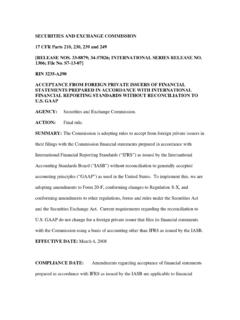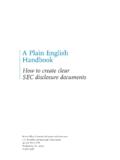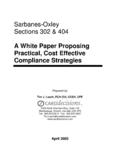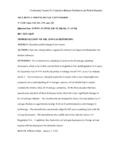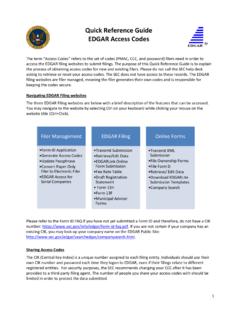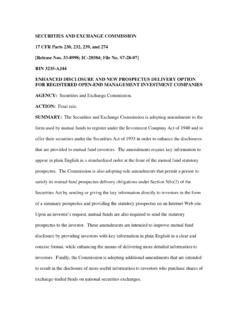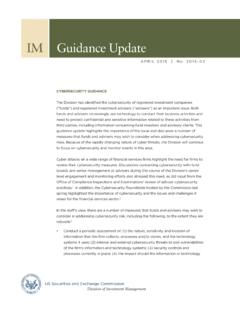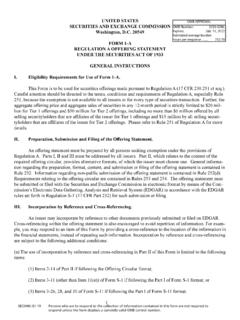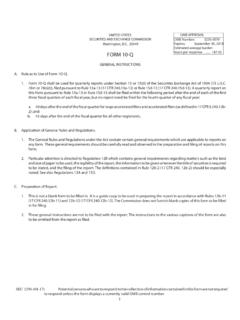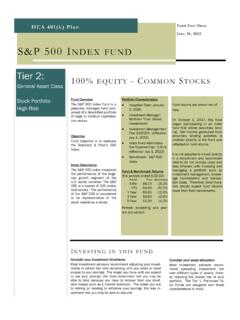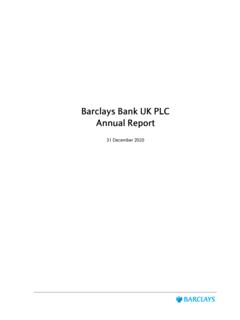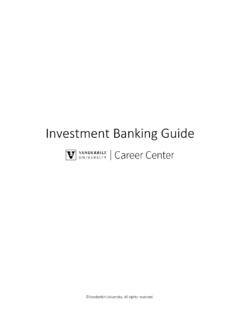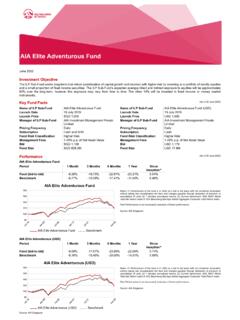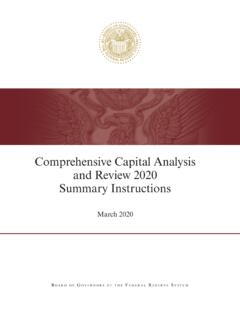Transcription of Overview of the Most Frequent Advisory Fee and Expense In ...
1 By the Office of Compliance Inspections and Examinations . Volume VII, Issue 2 April 12, 2018. Overview of the Most Frequent Advisory Fee and Expense In this Alert: Compliance Issues Identified in Examinations of Investment Topic: The most Advisers Frequent Advisory fee and Expense compliance I. Introduction issues identified in The Office of Compliance Inspections and Examinations ( OCIE ) is deficiency letters sent to providing a list of compliance issues relating to fees and expenses SEC-registered charged by SEC-registered investment advisers ( advisers ) that were investment advisers. the most frequently identified in deficiency letters sent to Key Takeaways: The disclosure that clients receive, especially regarding Advisory fees Advisers should review and expenses, is critical to their ability to make informed decisions, their practices, policies, including about whether to engage or retain an adviser.
2 And procedures to ensure compliance with The terms of a client's Advisory fees and expenses are typically their Advisory detailed in an Advisory agreement and described in an adviser's Form agreements and ADV and other materials provided to the client. An adviser that fails representations to to adhere to the terms of these agreements and disclosures, or clients in light of the fee otherwise engages in inappropriate fee billing and Expense practices, and Expense issues may violate the Investment Advisers Act of 1940 ( Advisers Act ),2. noted in this Risk Alert. and the rules promulgated thereunder, including the antifraud Moreover, advisers must adopt and implement written policies and procedures reasonably designed to prevent such This Risk Alert includes observations by OCIE staff and.
3 The views expressed herein are those of the staff of OCIE. The Securities and Exchange Commission (the SEC or the Commission ) has expressed no view on the contents of this Risk Alert. This document was prepared by SEC staff and is not legal advice. 1. This Risk Alert reflects issues identified in deficiency letters from over 1,500 adviser examinations completed during the past two years. 2. See Sections 206(1) and 206(2) of the Advisers Act. See also SEC v. Capital Gains Research Bureau, Inc., 375. 180 (1963). 3. The SEC has brought enforcement actions, charging advisers with Advisers Act violations, based on this type of conduct. See, , In the Matter of barclays Capital Inc., Advisers Act Rel. No. 4705 (May 10, 2017) (settled order) (finding that adviser violated Section 206(2) of the Advisers Act by incorrectly calculating the Advisory fees based on, among other things, a billing methodology that differed from the Advisory agreements) and In the Matter of Morgan Stanley Smith Barney, LLC, Advisers Act Rel.
4 No. 4607 (Jan. 13, 2017) (settled order). (finding that adviser violated Section 206(2) by charging clients Advisory fees that did not reflect negotiated discounts). 4. Advisers Act Rule 206(4)-7. 1. is intended to highlight some of the risks and issues associated with Advisory fees and expenses. II. Most Frequent Compliance Issues Related to Advisory Fees and Expenses Below are the most Frequent deficiencies that OCIE staff has identified pertaining to Advisory fees and Fee-Billing Based on Incorrect Account Valuations. OCIE staff has observed advisers that incorrectly valued certain assets in clients' accounts resulting in overbilled Advisory fees. Because advisers generally assess fees as a percentage of the value of assets they manage in each client's account, an incorrect account valuation will lead to an incorrect Advisory fee being assessed to that client.
5 For example, staff observed advisers that: o Valued assets in a client's account using a different metric than that which was specified in the client's Advisory agreement, such as using the asset's original cost to value an illiquid asset rather than valuing the asset based on its fair market value. o Valued a client's account using a process that differed from the process specified in the client's Advisory agreement, such as: Using the market value of the account's assets at the end of the billing cycle, instead of using the average daily balance of that account over the entire billing cycle as specified in the Advisory agreement. Including assets in the fee calculation that were excluded by the Advisory agreement from the management fee, such as cash or cash equivalents, alternative investments, or variable annuities.
6 Billing Fees in Advance or with Improper Frequency. OCIE staff has observed issues with advisers' billing practices relating to the timing and frequency for which Advisory fees were billed. Staff observed, for example, advisers that: o Billed Advisory fees on a monthly basis, instead of on a quarterly basis as stated in the Advisory agreement or disclosed in Form ADV Part 2. Similarly, staff observed advisers that billed Advisory fees in advance, despite the Advisory agreement specifying that clients would be billed in arrears. o Billed a new client for Advisory fees in advance for an entire billing cycle, instead of pro-rating such charges to reflect that the Advisory services began mid-billing cycle. Relatedly, staff observed advisers that did not reimburse a client a pro- rated portion of the Advisory fees when the client terminated the Advisory services mid-billing cycle, despite disclosing that they would do so in Form ADV Part 5.
7 This Risk Alert does not address all deficiencies or weaknesses related to Advisory fees and expenses. 6. See Item 5D of Form ADV Part 2A ( If your clients either may or must pay your fees in advance, disclose this fact. Explain how a client may obtain a refund of a pre-paid fee if the Advisory contract is terminated before the end of the billing period. Explain how you will determine the amount of the refund. ). 2. Applying Incorrect Fee Rate. OCIE staff has observed advisers that applied an incorrect fee rate when calculating the Advisory fees charged to certain clients. Staff observed, for example, advisers that: o Applied a rate higher than what was agreed upon in the Advisory agreement or double-billed a client. o Charged a non-qualified client performance fees based on a percentage of their capital gains inconsistent with Section 205(a)(1) of the Advisers Omitting Rebates and Applying Discounts Incorrectly.
8 OCIE staff has observed advisers that did not apply certain discounts or rebates to their clients' Advisory fees, as specified in the Advisory agreements, causing the clients to be overcharged. For example, staff observed advisers that: o Did not aggregate client account values for members of the same household for fee-billing purposes, which would have qualified such clients for discounted fees according to the adviser's Form ADV or Advisory agreement. o Did not reduce a client's fee rate when the value of that client's account reached a prearranged breakpoint level, which entitled that client to a lower fee rate according to the adviser's Form ADV or Advisory agreement. o Charged a client additional fees, such as brokerage fees, when such client was in the adviser's wrap fee program and the transactions qualified for the program's bundled fee.
9 Disclosure Issues Involving Advisory Fees. OCIE staff has observed several issues with respect to advisers' disclosures of fees or billing practices. For example, staff observed advisers that: o Made a disclosure in the Form ADV that was inconsistent with their actual practices, such as advisers that disclosed in the Form ADV a maximum Advisory fee rate, but nevertheless had an agreement with a certain client to charge a fee rate exceeding that disclosed maximum o Did not disclose certain additional fees or markups in addition to Advisory fees, such as advisers that did not disclose that they: Collected expenses from a client for third-party execution and clearing 7. See Advisers Act Section 205(a)(1) ( No investment adviser registered or required to be registered with the Commission shall enter into, extend, or renew any investment Advisory contract.)
10 If such contract provides for compensation to the investment advisers on the basis of a share of capital gains upon or capital appreciation of the funds or any portion of the funds of the client ); see also Advisers Act Rule 205-3 (exempting a qualified client from the prohibition under Advisers Act Section 205(a)(1)). 8. See, , Item 5 of Form ADV Part 2A ( Describe how you are compensated for your Advisory services. Provide your fee schedule.. Describe any other types of fees or expenses clients may pay in connection with your Advisory services, such as custodian fees or mutual fund expenses. Disclose that clients will incur brokerage and other transaction costs, and direct clients to the section(s) of your brochure that discuss brokerage.. If your clients either may or must pay your fees in advance, disclose this fact.
